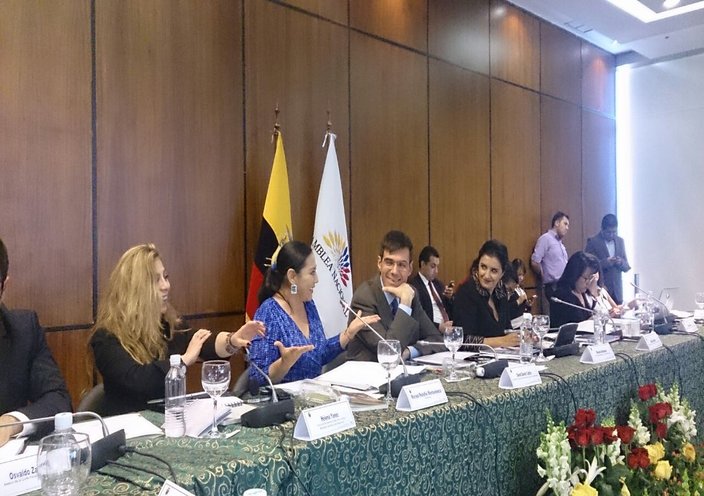
Quito /The Hague/New York, 13 February, 2015: In the context of the Campaign for the Effectiveness and Universality of the Rome Statute (the Campaign for the Rome Statute of the ICC), PGA, together with the National Assembly of Ecuador, convened a Technical Round Table on the Implementation of the Rome Statute and the Ratification of Kampala Amendments on 12 February, 2015 as well as a Conference in the Central University on 13 February, 2015 in Quito, Ecuador. This activity is the culmination of a project led by parliamentarians that attended the Montevideo Technical Round Tables in of September 2013 and August 2014. These workshops were focused on the full implementation of the Rome Statute and they triggered the PGA members´ leadership efforts to include all Rome Statute crimes in the revised Organic Criminal Code which was adopted in Jan. 2014
This gathering of members of the Justice and Foreign Affairs Committees of the National Assembly of Ecuador, representatives of the Ministry of Foreign Affairs and academia, aimed at strengthening legislative efforts undertaken at the national level in order to ensure the effective implementation of the Rome Statute and the ratification of the Kampala Amendments. The Technical Round Table provided a space for the discussion and analysis of these instruments, particularly relevant for the promotion and maintenance of peace and security, not only in Ecuador but also around the world.
The debates on the Organic Criminal Code currently taking place under the Justice committee will benefit from this Round Table as it addressed important technical aspects in relation to the substantive and procedural implementation of the Rome Statute at the national level as well key points connected to the ratification of the Kampala Amendments on the crime of aggression and the use of certain weapons in armed conflict. Expanding the edges for discussion about the domestic implementation of international criminal law, the following issues, amongst others, are discussed: definitions of the crimes of genocide, crimes against humanity and war crimes, obligations for cooperation with the ICC, arrest warrants, surrender of accused persons, assets freezing, sentencing, witnesses’ protection and the presentation of the project for the cooperation law with the ICC.
Statement of Marisol Peñafiel, MP (Ecuador): “The National Assembly of Ecuador has made significant progress on criminal legislation, this progress has captured the interest of experts in international criminal law, whose comments are important in order to assess the legislative development in Ecuador. We truly hope that this Round Table will bring further progress towards the full implementation of the Rome Statute on complementarity and cooperation issues as well as the ratification of the Kampala Amendments. These steps are vital in order to fulfill with the commitment that Ecuador took when it ratified the Rome Statute to fully cooperate with the International Criminal Court in order to strengthen the international criminal law system established by the Rome Statute and upon which the international fight against impunity so much depends.”
Statement of Fernando Bustamante, MP (Ecuador): “Determining the relevance of the ratification of the Kampala amendments and the effective implementation of the Rome Statute of the International Criminal Court, requires spaces of exchange and analysis of information. This roundtable has certainly offered essential tools and contributed to the strengthening the debates currently taking place in Ecuador and will have a long lasting effect. The concrete progress in the legislative efforts to bring the ICC system to its effective application will be an evidence of the engagement undertaken by many participants who believe in the establishment of an international criminal law system that promotes the fight against impunity and the establishment of the Rule of Law.”
Statement of Mauro Andino, MP (Ecuador), Chair of the Justice and State Structure Committee of the National Assembly: “The legal system of Ecuador must reflect the current developments of international law in the fields of human rights and the fight against impunity. This is why, debates of an international character and which include the different voices of legislators, members of the ICC, academia, and many other relevant actors are of utmost importance. This give us an opportunity to see the relevant issues through different angles, enabling us to reach a better understanding of how to design the best and most efficient strategy for the domestic implementation of the ICC and the ratification the Kampala Amendments; both, key elements in the fight against impunity and the respect and promotion of human rights.”
{flike}{/flike}